Abstract
Mice injected at birth with semi-allogeneic lymphoid cells develop a lupus-like autoimmune syndrome in which donor B cells are polyclonally activated by host alloreactive CD4+ T cells, producing autoantibodies and immune complex-mediated glomerulonephritis. It has been demonstrated that the recognition of major histocompatibility complex (MHC) class II alloantigens triggers the development of a complete disease. But differences in either MHC class I molecules or Mls-1 antigens are not sufficient to induce production of autoantibodies. Here we have investigated whether differences in other non-MHC alloantigens could induce a similar autoimmune disease and whether the maternal environment could modulate the T-B allogeneic co-operation in this model. For this purpose (BALB/c x BC20)F1 hybrid females were backcrossed with BC20 males. R2 mice obtained in this backcross were neonatally injected with 10(8) (C57BL/6 x BALB.Igb)F1 spleen cells and the tolerance against maternal derived BALB/c alloantigens as well as the development of autoimmune manifestations were subsequently evaluated. In contrast to R2 mice injected at birth with (C57BL/6 x BALB.Igb)F1 cells, control R2 mice rejected skin grafts from BALB/c mice and B cells from (C57BL/6 x BALB.Igb)F1 mice, independently of their H-2 haplotype (H-2b/d or H-2b/b). Nevertheless, after neonatal injection of (C57BL/6 x BALB.Igb)F1 cells, none of 19 H-2b/d R2 injected mice presented autoimmune manifestations, in contrast with the typical autoimmune disease observed in all neonatally injected H-2b/b R2 mice (26 mice). These results support that the development of autoimmunity in this model depends exclusively upon differences in MHC class II alloantigens and that the relationship between mother and fetus, through the pregnancy or the breast suckling, is not sufficient to inhibit cytolytic and allo-helper responses against non-inherited maternal-derived alloantigens.
Full text
PDF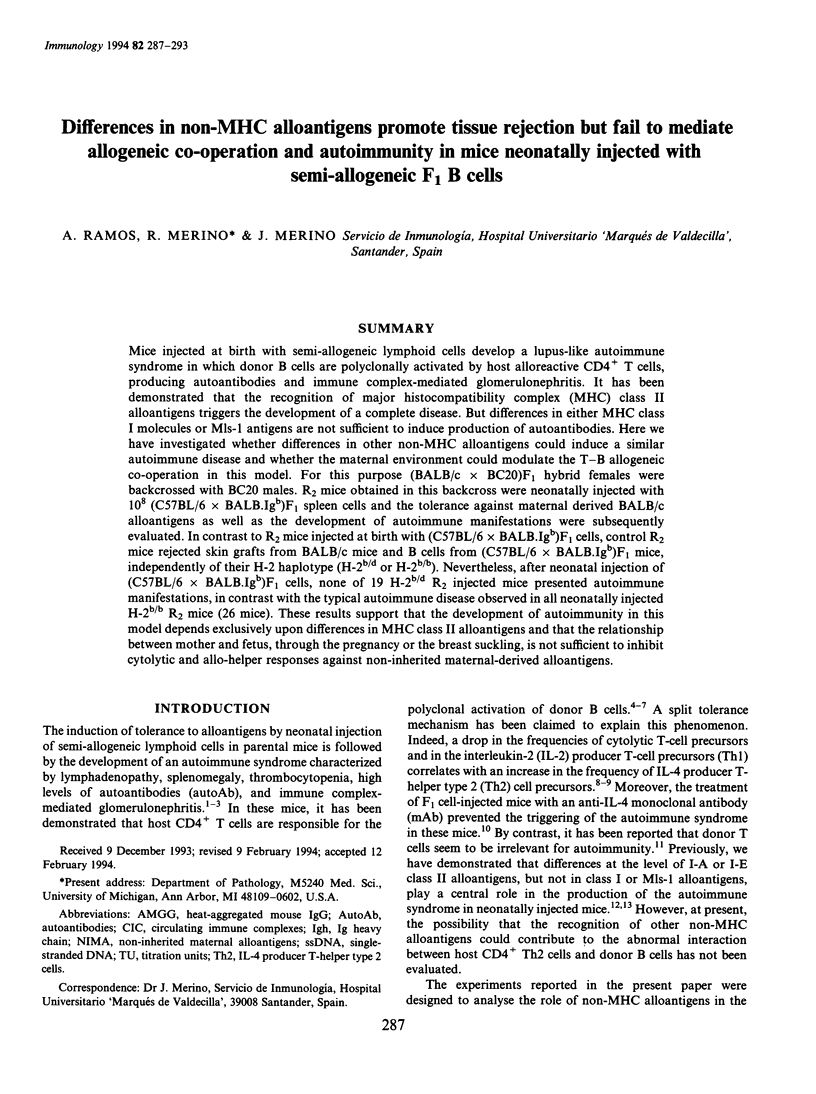
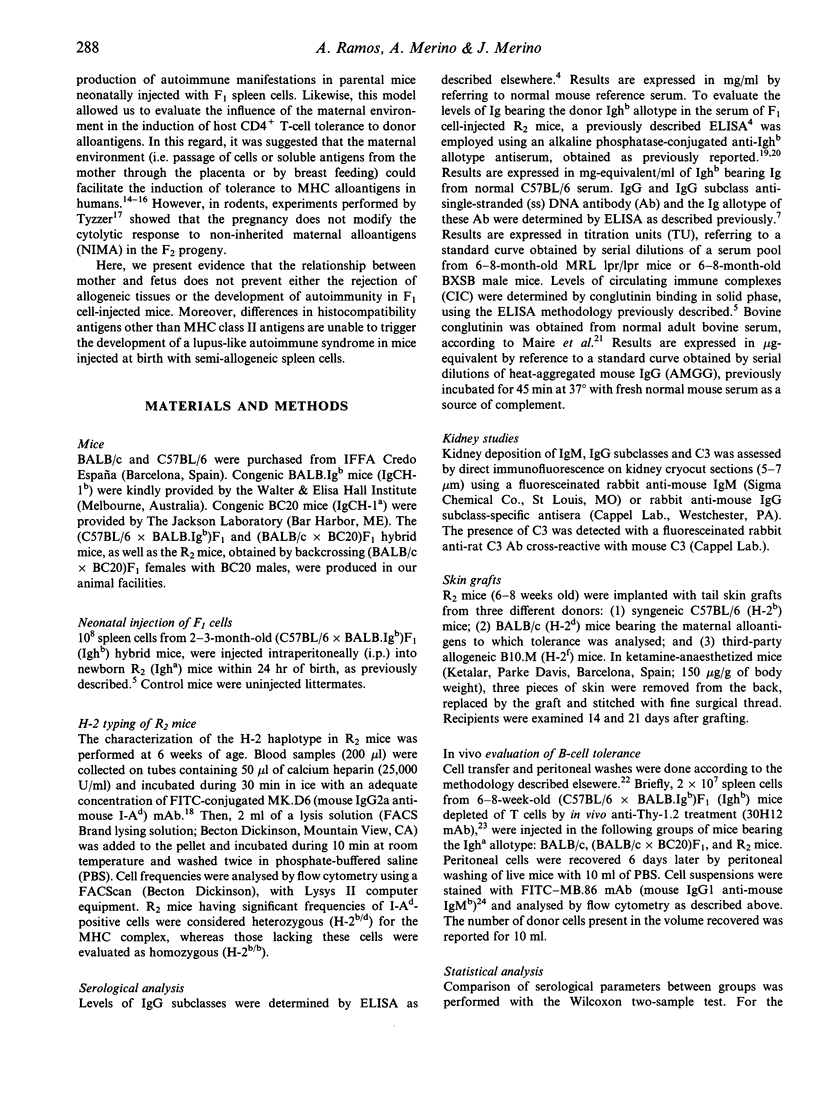
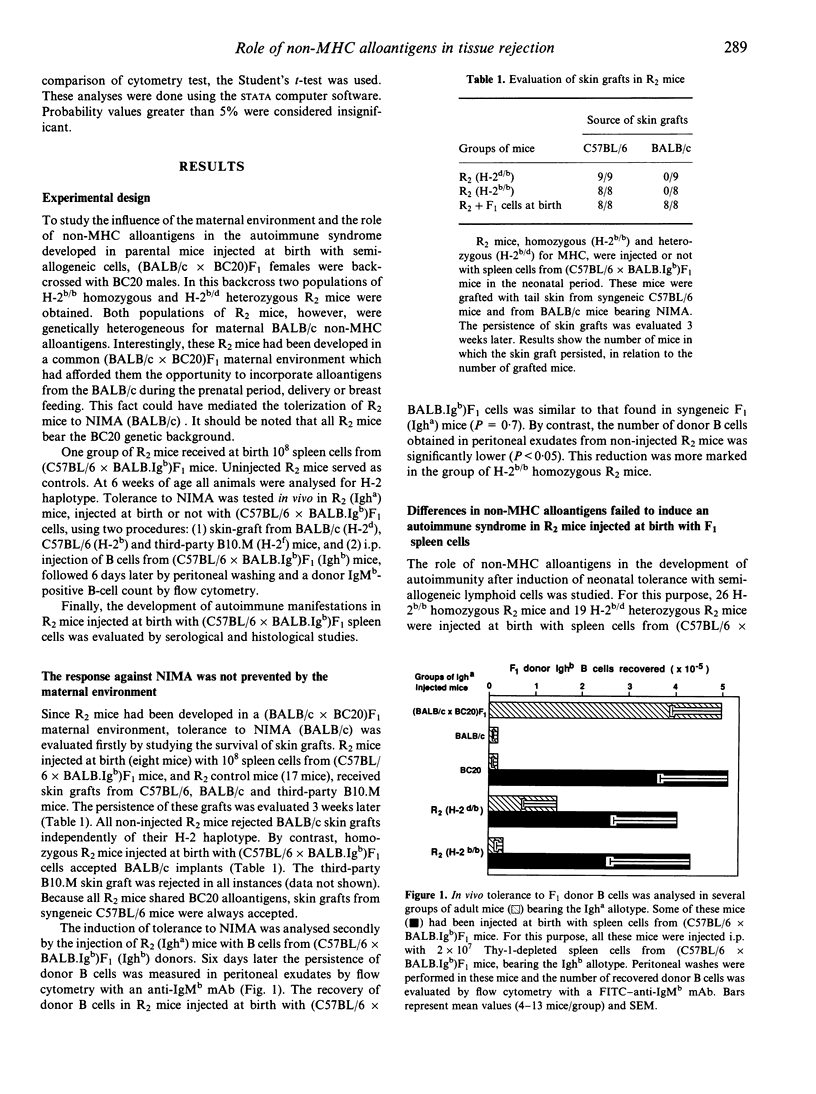
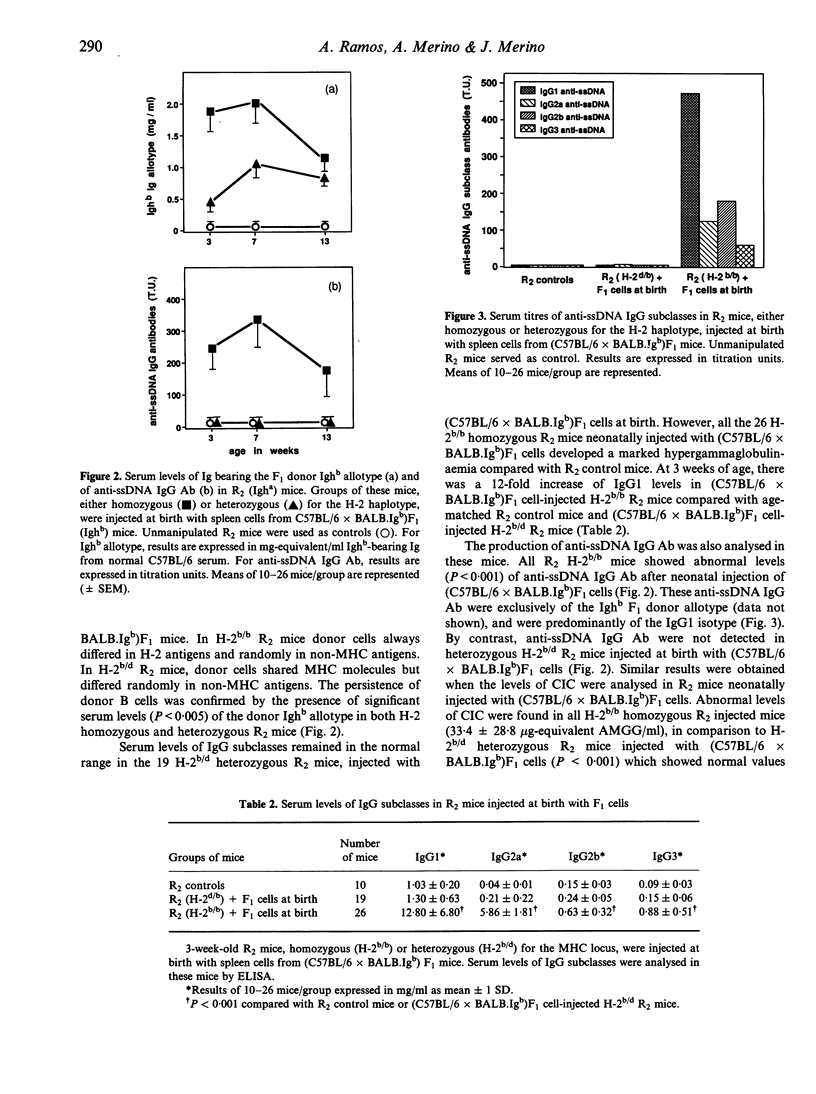
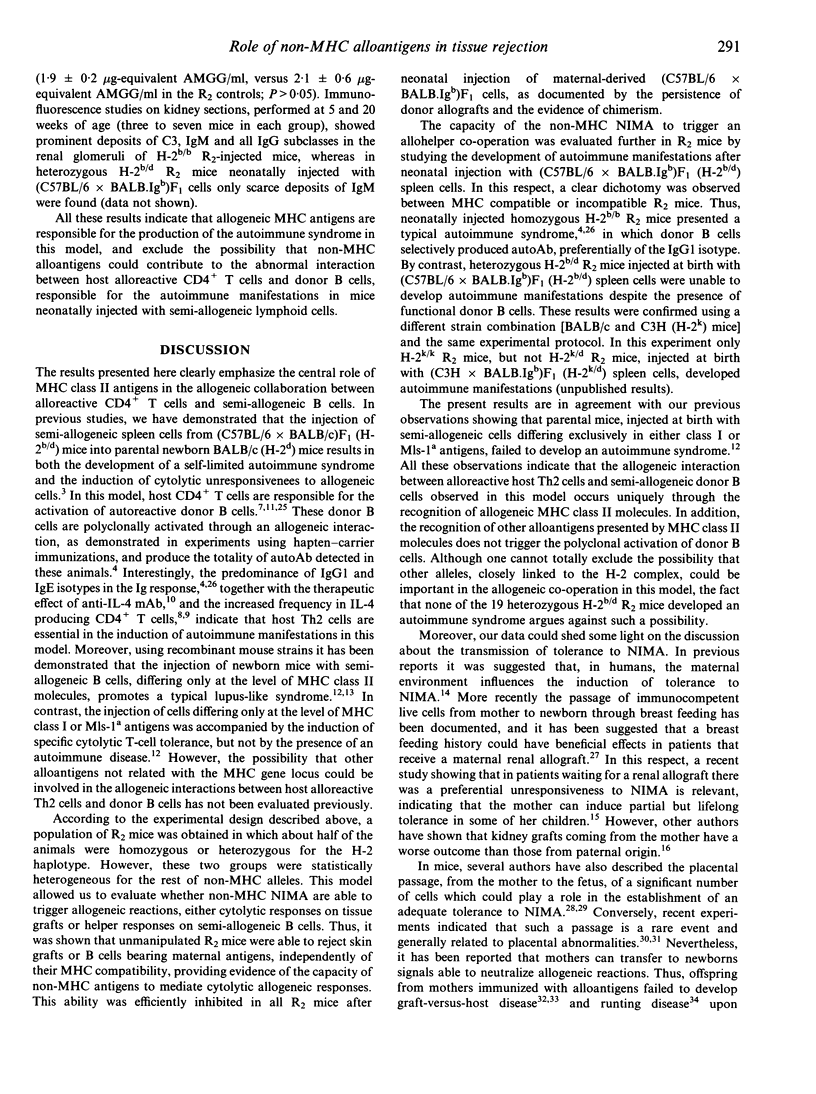
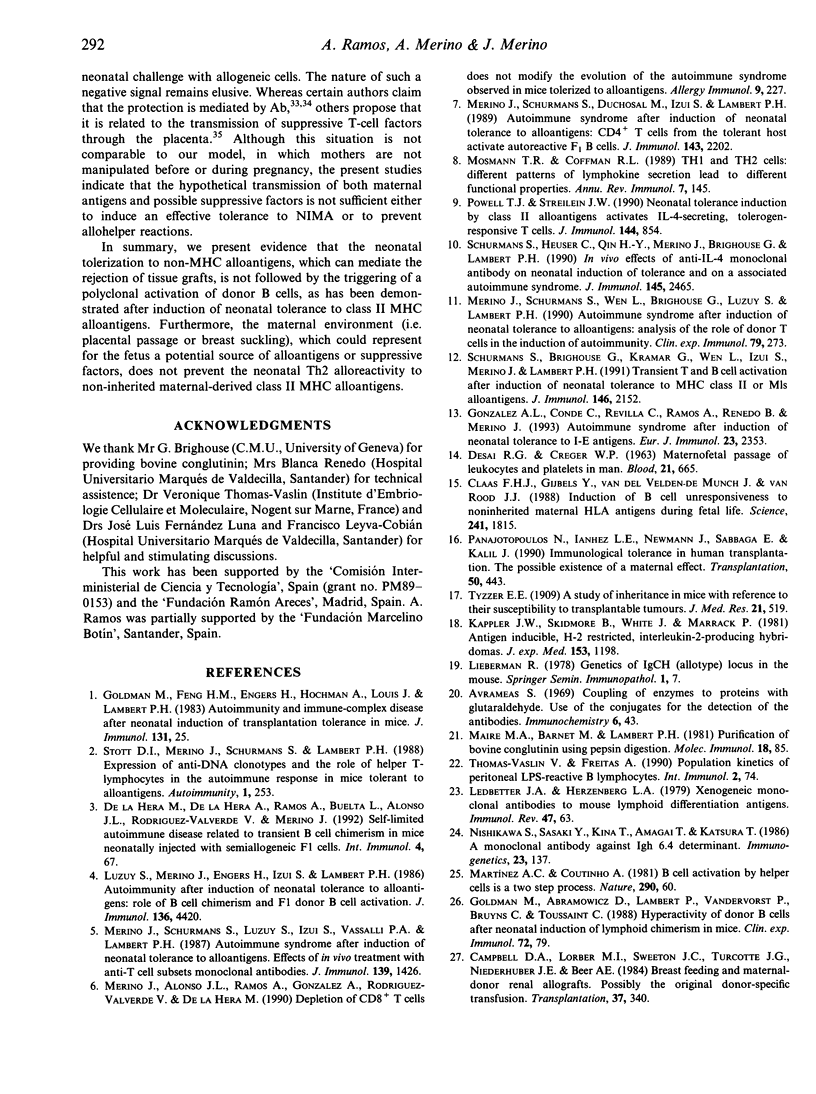
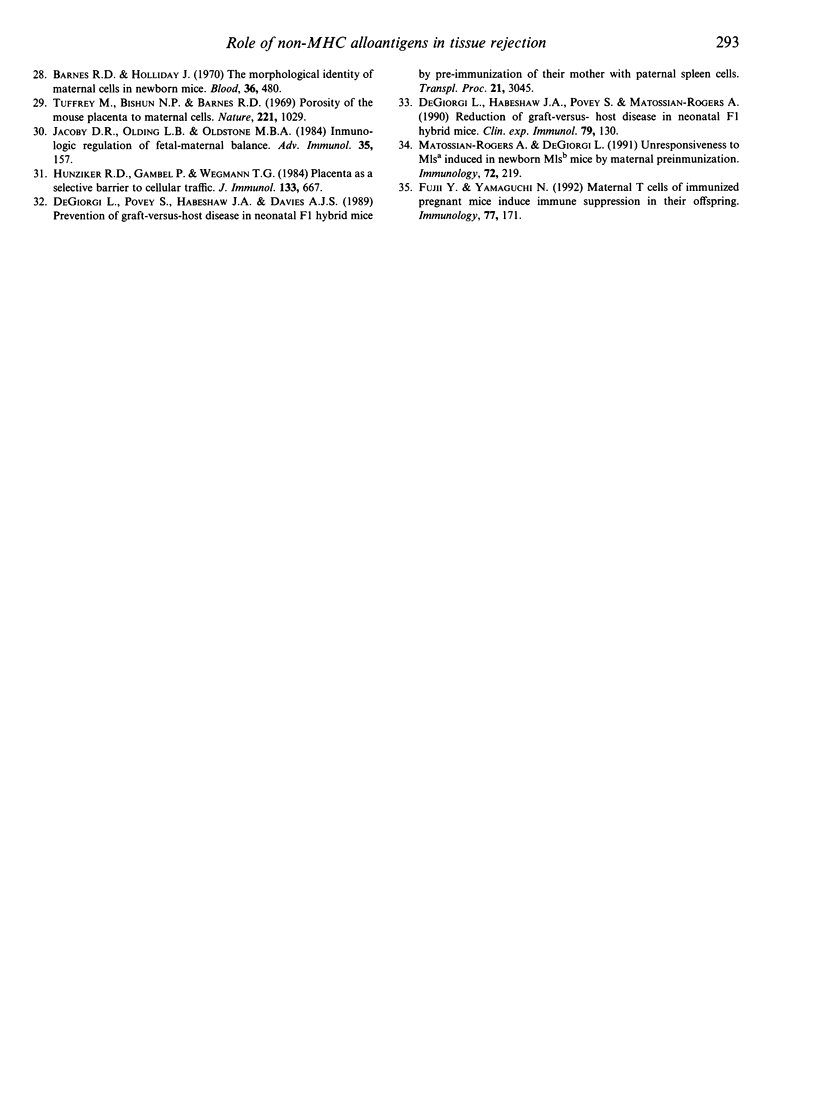
Selected References
These references are in PubMed. This may not be the complete list of references from this article.
- Avrameas S. Coupling of enzymes to proteins with glutaraldehyde. Use of the conjugates for the detection of antigens and antibodies. Immunochemistry. 1969 Jan;6(1):43–52. doi: 10.1016/0019-2791(69)90177-3. [DOI] [PubMed] [Google Scholar]
- Barnes R. D., Holliday J. The morphological identity of maternal cells in newborn mice. Blood. 1970 Oct;36(4):480–489. [PubMed] [Google Scholar]
- Campbell D. A., Jr, Lorber M. I., Sweeton J. C., Turcotte J. G., Niederhuber J. E., Beer A. E. Breast feeding and maternal-donor renal allografts. Possibly the original donor-specific transfusion. Transplantation. 1984 Apr;37(4):340–344. doi: 10.1097/00007890-198404000-00004. [DOI] [PubMed] [Google Scholar]
- Claas F. H., Gijbels Y., van der Velden-de Munck J., van Rood J. J. Induction of B cell unresponsiveness to noninherited maternal HLA antigens during fetal life. Science. 1988 Sep 30;241(4874):1815–1817. doi: 10.1126/science.3051377. [DOI] [PubMed] [Google Scholar]
- DESAI R. G., CREGER W. P. Maternofetal passage of leukocytes and platelets in man. Blood. 1963 Jun;21:665–673. [PubMed] [Google Scholar]
- DeGiorgi L., Habeshaw J. A., Povey S., Matossian-Rogers A. Reduction of graft-versus-host disease in neonatal F1 hybrid mice. Clin Exp Immunol. 1990 Jan;79(1):130–134. doi: 10.1111/j.1365-2249.1990.tb05139.x. [DOI] [PMC free article] [PubMed] [Google Scholar]
- DeGiorgi L., Povey S., Habeshaw J. A., Davies A. J. Prevention of graft-versus-host disease in neonatal F1 hybrid mice by pre-immunisation of their mother with paternal spleen cells. Transplant Proc. 1989 Feb;21(1 Pt 3):3045–3049. [PubMed] [Google Scholar]
- Fujii Y., Yamaguchi N. Maternal T cells of immunized pregnant mice induce immune suppression in their offspring. Immunology. 1992 Oct;77(2):171–176. [PMC free article] [PubMed] [Google Scholar]
- Gonzalez A. L., Conde C., Revilla C., Ramos A., Renedo B., Merino J. Autoimmune syndrome after induction of neonatal tolerance to I-E antigens. Eur J Immunol. 1993 Sep;23(9):2353–2357. doi: 10.1002/eji.1830230945. [DOI] [PubMed] [Google Scholar]
- Hunziker R. D., Gambel P., Wegmann T. G. Placenta as a selective barrier to cellular traffic. J Immunol. 1984 Aug;133(2):667–671. [PubMed] [Google Scholar]
- Jacoby D. R., Olding L. B., Oldstone M. B. Immunologic regulation of fetal-maternal balance. Adv Immunol. 1984;35:157–208. doi: 10.1016/s0065-2776(08)60576-3. [DOI] [PubMed] [Google Scholar]
- Kappler J. W., Skidmore B., White J., Marrack P. Antigen-inducible, H-2-restricted, interleukin-2-producing T cell hybridomas. Lack of independent antigen and H-2 recognition. J Exp Med. 1981 May 1;153(5):1198–1214. doi: 10.1084/jem.153.5.1198. [DOI] [PMC free article] [PubMed] [Google Scholar]
- Ledbetter J. A., Herzenberg L. A. Xenogeneic monoclonal antibodies to mouse lymphoid differentiation antigens. Immunol Rev. 1979;47:63–90. doi: 10.1111/j.1600-065x.1979.tb00289.x. [DOI] [PubMed] [Google Scholar]
- Luzuy S., Merino J., Engers H., Izui S., Lambert P. H. Autoimmunity after induction of neonatal tolerance to alloantigens: role of B cell chimerism and F1 donor B cell activation. J Immunol. 1986 Jun 15;136(12):4420–4426. [PubMed] [Google Scholar]
- Maire M. A., Barnet M., Lambert P. H. Purification of bovine conglutinin using pepsin digestion. Mol Immunol. 1981 Feb;18(2):85–89. doi: 10.1016/0161-5890(81)90073-0. [DOI] [PubMed] [Google Scholar]
- Matossian-Rogers A., DeGiorgi L., DeGiori L. Unresponsiveness to Mlsa induced in newborn Mlsb mice by maternal preimmunization. Immunology. 1991 Feb;72(2):219–225. [PMC free article] [PubMed] [Google Scholar]
- Merino J., Schurmans S., Duchosal M. A., Izui S., Lambert P. H. Autoimmune syndrome after induction of neonatal tolerance to alloantigens. CD4+ T cells from the tolerant host activate autoreactive F1 B cells. J Immunol. 1989 Oct 1;143(7):2202–2208. [PubMed] [Google Scholar]
- Merino J., Schurmans S., Luzuy S., Izui S., Vassalli P., Lambert P. H. Autoimmune syndrome after induction of neonatal tolerance to alloantigens: effects of in vivo treatment with anti-T cell subset monoclonal antibodies. J Immunol. 1987 Sep 1;139(5):1426–1431. [PubMed] [Google Scholar]
- Merino J., Schurmans S., Wen L., Brighouse G., Luzuy S., Lambert P. H. Autoimmune syndrome after induction of neonatal tolerance to alloantigens: analysis of the role of donor T cells in the induction of autoimmunity. Clin Exp Immunol. 1990 Feb;79(2):273–278. doi: 10.1111/j.1365-2249.1990.tb05190.x. [DOI] [PMC free article] [PubMed] [Google Scholar]
- Mosmann T. R., Coffman R. L. TH1 and TH2 cells: different patterns of lymphokine secretion lead to different functional properties. Annu Rev Immunol. 1989;7:145–173. doi: 10.1146/annurev.iy.07.040189.001045. [DOI] [PubMed] [Google Scholar]
- Nishikawa S., Sasaki Y., Kina T., Amagai T., Katsura Y. A monoclonal antibody against Igh6-4 determinant. Immunogenetics. 1986;23(2):137–139. doi: 10.1007/BF00377976. [DOI] [PubMed] [Google Scholar]
- Panajotopoulos N., Ianhez L. E., Neumann J., Sabbaga E., Kalil J. Immunological tolerance in human transplantation. The possible existence of a maternal effect. Transplantation. 1990 Sep;50(3):443–445. doi: 10.1097/00007890-199009000-00016. [DOI] [PubMed] [Google Scholar]
- Powell T. J., Jr, Streilein J. W. Neonatal tolerance induction by class II alloantigens activates IL-4-secreting, tolerogen-responsive T cells. J Immunol. 1990 Feb 1;144(3):854–859. [PubMed] [Google Scholar]
- Schurmans S., Brighouse G., Kramer G., Wen L., Izui S., Merino J., Lambert P. H. Transient T and B cell activation after neonatal induction of tolerance to MHC class II or Mls alloantigens. J Immunol. 1991 Apr 1;146(7):2152–2160. [PubMed] [Google Scholar]
- Schurmans S., Heusser C. H., Qin H. Y., Merino J., Brighouse G., Lambert P. H. In vivo effects of anti-IL-4 monoclonal antibody on neonatal induction of tolerance and on an associated autoimmune syndrome. J Immunol. 1990 Oct 15;145(8):2465–2473. [PubMed] [Google Scholar]
- Stott D. I., Merino J., Schurmans S., Lambert P. H. Expression of anti-DNA clonotypes and the role of helper T-lymphocytes during the autoimmune response in mice tolerant to alloantigens. Autoimmunity. 1988;1(4):253–266. doi: 10.3109/08916938809010679. [DOI] [PubMed] [Google Scholar]
- Tuffrey M., Bishun N. P., Barnes R. D. Porosity of the mouse placenta to maternal cells. Nature. 1969 Mar 15;221(5185):1029–1030. doi: 10.1038/2211029a0. [DOI] [PubMed] [Google Scholar]
- de la Hera M., de la Hera A., Ramos A., Buelta L., Alonso J. L., Rodriguez-Valverde V., Merino J. Self-limited autoimmune disease related to transient donor B cell activation in mice neonatally injected with semi-allogeneic F1 cells. Int Immunol. 1992 Jan;4(1):67–74. doi: 10.1093/intimm/4.1.67. [DOI] [PubMed] [Google Scholar]


